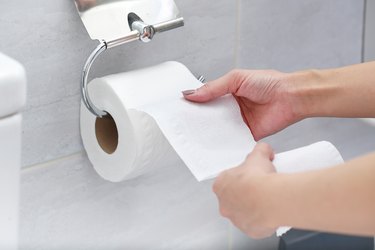
Look, there's a reason why bathrooms are equipped with a fan: Yeah, it's to get rid of moisture from your shower, but it also zips odors outta there. Because, people, your poop smells.
Granted, you probably already know that. But did you know poop odor can clue you into what's going on with your gut health?
Video of the Day
Video of the Day
Here, learn about all the reasons why your poop smells so bad, what your poop scent reveals and how to fix it, according to gastroenterologists.
Warning
If you experience a change in poop smell along with symptoms like diarrhea, fever, chills or unexplained weight loss, it could indicate an underlying medical condition. Talk to your doctor about diagnosis and treatment options.
Wait, Why Does Poop Smell?
You may notice that your BMs, in general, tend to have a similar scent. So to start, why does poop smell?
"The routine odor of stool is based on your gut microbiota. Namely, the type of bacteria you have and how this bacteria ferments the food in your diet," Michael D. Brown, MD, gastroenterologist and professor of medicine at Rush University Medical Center in Chicago, tells LIVESTRONG.com.
This microbiota was "given to you by your mother," and is difficult to change, Dr. Brown adds. If you are taking antibiotics or probiotics, once you stop taking them, your gut microbiota will revert back to your body's "normal."
What Causes Foul-Smelling Poop?
If your poop, however, is straight-up foul, there could be a number of reasons why. Some common ones include:
1. Certain Foods and Alcohol
The food you eat can make a specific poop more putrid or pleasant. Dr. Brown says these typically include:
- Carbohydrates: Highly fermentable, so they will influence smell
- Garlic and onions: Top offenders that make things more odorous, as they contain sulfates, which break down into smelly substances (hence, why your poop smells like sulfur)
- Legumes and beans: Contain an enzyme that inhibits their digestion and gives you more gas (which is why your farts smell so bad, too)
And that rotten-egg smell? Typical for foods high in sulfates. Other sulfate-containing culprits are high-fat foods, dairy, meat and alcohol, says Niket Sonpal, MD, an internist and gastroenterologist in New York City.
Drinking alcohol can also affect your gut's microbiome and your poop. In fact, a 2017 study in Alcohol Research found drinking alcohol increases gut inflammation, leading to bacterial overgrowth.
There's no way to stop your poop from smelling — stinky BMs are a fact of life. But avoiding or limiting these types of foods and drinks might prevent your poop from smelling especially bad.
2. Dehydration
When you're dehydrated, your risk of constipation increases. Drinking water helps move stool through your digestive system more easily. So when poop sits in your colon for too long, it can start to acquire a different (and stinky) smell, per the Mayo Clinic.
Causes of dehydration include losing water quicker than you drink it, excessive sweating and certain medications like diuretics (or water pills), per the Cleveland Clinic.
3. Lack of Fiber
If you don't eat enough food high in fiber, you're also likely to experience constipation. Fiber helps bulk the stool and regulate your bowels, helping you go more easily and regularly.
Without enough fiber, your stool will stay in your colon longer, causing it to smell bad, per the Mayo Clinic.
4. Lactose Intolerance
If you're lactose intolerant, your body doesn't produce enough lactase, which helps break down the two sugars in lactose — glucose and galactose.
Your body's lack of lactase causes dairy to stay in the digestive system longer, causing poop to ferment and unfortunately, smell, per the U.K.'s National Health Service.
5. Infection
Does smelly poop mean infection? Turns out, it can.
Foul-smelling poop can be a sign of a viral, bacterial or parasitic infection. Parasites in the stool will typically come with other symptoms like abdominal pain, diarrhea, bloating, waking up to poop, rash or fatigue, and will require a stool sample test to determine the proper course of treatment, per Mount Sinai. (More on treatment below.)
6. Dietary Supplements or Medications
While taking certain vitamins and supplements can cause a stinky body odor (like B vitamins thiamin and choline), per MIT Health, they can also cause your poop to smell bad, too.
Medications like antibiotics can also make your poop smell more foul than usual. (More on this below.)
Why Do Farts Smell?
Farts are a normal part of the digestion process and occur while your body is digesting food or after it's swallowed air. Farts are usually smelly because you ate something like beans, broccoli or eggs, which contain high levels of fiber and sulfites. Smelly farts can also be a symptom of gut flora fluctuation, medication, constipation or illness, per the Cleveland Clinic.
If smelly farts come with other symptoms like diarrhea or constipation, you could have a larger medical issue, so be sure to talk to your doctor.
What Different Poop Smells Might Mean
We've established that most of the time, smelly poop is healthy and normal (just like it's normal to have a really big poop every now and then).
"It's not necessarily unhealthy for your poop to smell. Some people have smellier stool than others, and most people occasionally experience rancid-smelling poops," Dr. Sonpal says.
However, if you're still unsure of the cause of your smelly stool and are hoping to analyze your poop smell for your health, here's what a few distinct scents might mean:
1. Your Poop Smells Metallic or Especially Pungent
If you have blood in your stool, you may notice a metallic or chemical poop smell. Your stool will have a "unique and unmistakable smell," Dr. Brown says. GI doctors, he says, can readily identify this when they walk down the hall of a hospital, but for the untrained nose (that's you), rather than sniffing out blood, pay attention to the way it looks.
Black, tarry stools are a red flag, as this indicates the presence of blood. This often points to bleeding in the upper GI tract (esophagus, stomach or part of the small intestine), or a peptic ulcer in the stomach, according to the U.S. National Library of Medicine.
In rare cases, foul-smelling poop can be a sign of cancer, especially if it comes with black, tarry stool. It could be esophageal or stomach cancer.
Always call your doctor if you have black, tarry stools, if your stool has bright red blood or if it has a metallic smell.
"It's not necessarily unhealthy for your poop to smell. Some people have smellier stool than others, and most people occasionally experience rancid-smelling poops."
2. Your Poop Smells Like Vomit or Sewer Gas (aka Really Bad)
Another reason to get on the phone with your doc? If the smell is "genuinely and severely unbearable," Dr. Sonpal says.
If your poop burns like acid, your stool is waxy or tacky in texture or there's a sudden, drastic change in frequency, consistency and comfort in going to the bathroom, call your doctor. These may be signs of infection or a digestive condition, he says.
One example of an infection that contributes to an unpleasant BM: Giardiasis, caused by an intestinal parasite called giardia. You can get this when eating contaminated food or drinking contaminated water (like from a stream when camping). Along with smelling bad, you'll also get explosive, watery, burning diarrhea, notes Johns Hopkins Medicine, which may lead to poop sweats and feeling cold after pooping.
The tricky part is that symptoms don't usually start until one or two weeks after you're infected, so it may be tough to pin down exactly what happened.
Digestive conditions that can contribute to foul-smelling stool include celiac disease, Crohn's disease, chronic pancreatitis and diseases that cause malabsorption (i.e., pooping undigested food), like cystic fibrosis and pancreatic infection, according to Mount Sinai. You may lose weight when you poop, and experience other symptoms like weakness and fatigue.
Malabsorption could mean that you're not properly absorbing fats (called steatorrhea), which results in a "rotten food smell," Dr. Brown says. Also look for lighter-color stools (like clay or white), which may clue you into something going on with your pancreas.
3. Your Poop Smells Sweet
An infection that can lead to a very unpleasant, sweet-smelling stool is C. diff, which can happen when you're taking antibiotics and also includes symptoms such as diarrhea, fever, loss of appetite and stomach pain, according to the Centers for Disease Control and Prevention (CDC). If you have sweet-smelling poop with any of these symptoms, let your doctor know.
When to See a Doctor for Treatment
If it's normal to have smelly poop every now and then, you might be thinking, "Should I even be worried about my poop smell?"
Bottom line: Stinky poop is normal, especially if you've made some diet changes. For example, eating a few meals high in onions will have an effect for a few days, but then may change if onions are avoided.
But if it's extra smelly and accompanied by other symptoms like abdominal pain and bloating, diarrhea, nausea and vomiting, bloody stool, fever, chills or sweating, call your doctor.
Prior to your visit, you may want to track what foods you eat to see if any high-sulfur, high-sugar or dairy products are the culprit. You may even be allergic to some foods. Avoiding those foods may be the only way to stop poop smelling.
If your symptoms are not associated with any particular food, you may have an infection or parasite that needs treating with antibiotics and antiparasitics, per the Cleveland Clinic.
- U.S. National Library of Medicine: "Black or Tarry Stools"
- Mount Sinai: "Stools – foul smelling"
- Johns Hopkins Medicine: "Giardiasis"
- Centers for Disease Control and Prevention: "What is C. diff?"
- Mount Sinai: "Malabsorption"
- Cleveland Clinic: "Why Do Farts Smell and What Does That Say About Your Health?"
- Mayo Clinic: "Does drinking water during or after a meal affect or disturb digestion?"
- Mayo Clinic: "Low-fiber diet do's and don'ts"
- National Health Service: "Lactose Intolerance"
- Alcohol Research: "Alcohol and Gut-Derived Inflammation"
- Mount Sinai: "Intestinal parasites information"
- MIT Health: "Could it B-Vitamins?"
- Cleveland Clinic: "Antiparasitic Drugs"
- Cleveland Clinic: "Dehydration"
Is this an emergency? If you are experiencing serious medical symptoms, please see the National Library of Medicine’s list of signs you need emergency medical attention or call 911.


